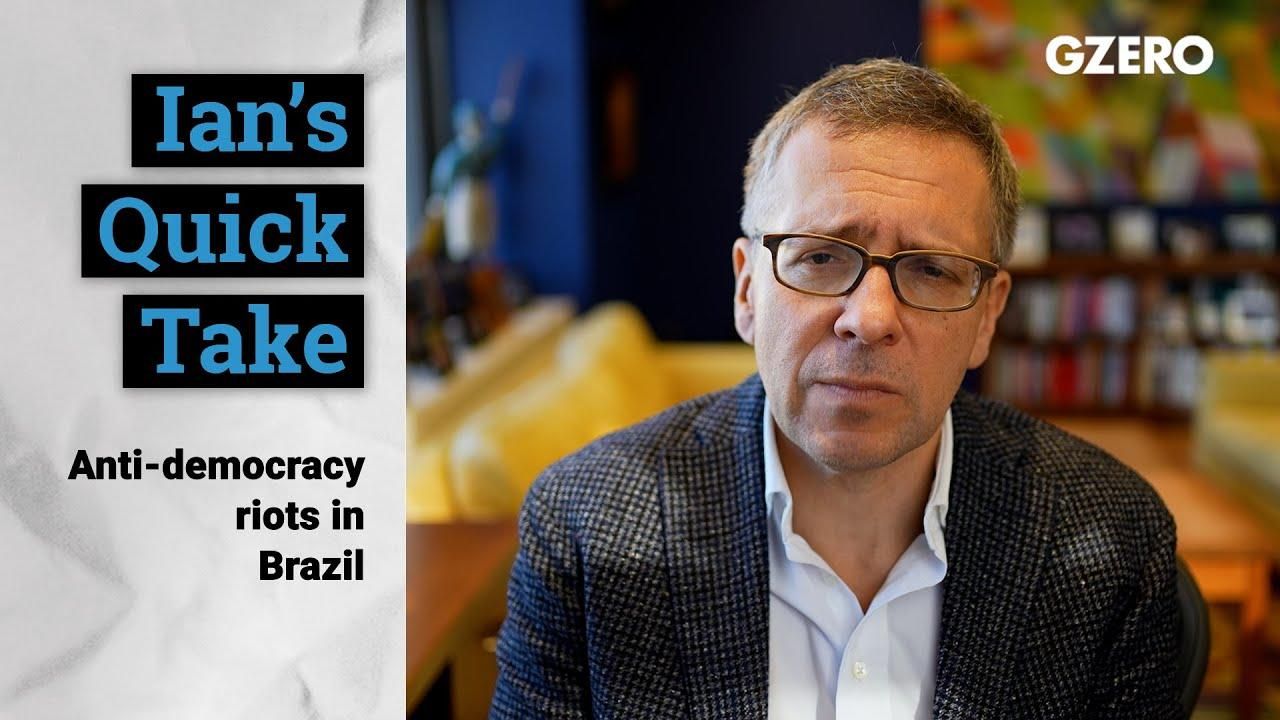Brazil insurrection over, but not the threat to democracy

Ian Bremmer's Quick Take:
Hi everybody. Ian Bremmer here, and a Quick Take to kick off your week.
And my god, Brazil, January 8th. We've seen something like that before. Yes, we have, if you're the United States. This was a large number, thousands of Brazilians wanting to stop the steal, that fake election that they had in Brazil just a couple months ago that Lula won, won it legitimately. But former President Bolsonaro refused to concede, made his chief of staff do it. And his supporters believe that the election was unfair, was rigged. And they've been in encampments for a couple of months now, thousands of them, and decided over the course of the weekend, a week after the inauguration, to forcibly occupy the headquarters, the most important buildings for the legislature, the Congressional palace, the executive, the Presidential palace, and the Supreme Court. And as a consequence, you saw all this damage, this vandalism being done, furniture being destroyed, windows being broken, art being stolen, you name it. And it's just an incredible shame, day of sadness for Brazil.
A few things that we should talk about. The first is that Bolsonaro has said nothing over the course of these last couple of weeks. He has certainly been promoting the idea that the election was stolen from him, but he's been in Florida. He was with Donald Trump in Mar-a-Lago bringing in the New Year, and since then has been in Orlando where he rented a house. And most recently after the protestors came in and formed this insurrection, he basically said that he condemned the violence. And that's a smart thing for him to do because everyone in Brazil is condemning this right now. All the political parties and the court and the military leaders, some 1,200 have already been arrested that participated in the break-ins.
Also, there's going to be a major investigation specifically into who funded. This was well organized, it was financed. There were buses that brought the people in to Brasilia. Where did that money come from? There's a lot of speculation given some of the advising that Trump, MAGA types have been providing to Bolsonaro, his son, Eduardo, and others, people like Steve Bannon, the former chief strategist of Trump, that some of the money came from the United States. That's speculation. There's no proof, there's no evidence at this point, but there will be a serious investigation. And when that comes out, that will clearly lead to knock-on effects, both for relations with the United States as well as the impact of politicization and polarization inside Brazil itself. Keep in mind that if it is found that there are such fingerprints on these demonstrations, the far-right wing in Brazil will call it fake news and disinformation. And for them, it will be yet another argument, a conspiracy theory that the establishment is against them no matter what.
There's not much impact on Brazil in the near-term, in the sense that all of the protestors have been cleared out. Lula is president and there was an easy and peaceful transfer of power to his administration just as there ultimately was in the United States in 2021. That's not going to change, but long-term, this is an agitated, radical, and potentially violent, serious number of people in Brazil that are willing to break things. They're angry and they're willing to break things. And as Lula's popularity, which is in the high fifties now, which is pretty good, but low for a honeymoon in Brazil, slips, both because he's been there for a while and also because Brazil's economy is under a lot of pressure, the potential for this to become a much more serious threat to Brazilian democracy over time is very real indeed.
One final point that I would make, and that is that this is an American export. We mentioned in our Top Risks back a week ago, risk number three, weapons of mass disruption, where we said that the United States, which had been the leading exporter of democracy in the world back when the wall came down in '89, frequently hypocritically, frequently without success, but nonetheless, in 2022-23, the US has become the leading exporter of tools that destroy democracy, and that is very much the case with what we're seeing in Brazil right now. Social media algorithms leading to political polarization and leading to an export of these tools into other countries that are more brittle, whose democratic institutions haven't been around for as long, whose institutions are not as legitimized and aren't as entrenched, and has the potential to break those democracies.
Horrible to see that coming from the United States, not the intention of what these social media companies and these technology billionaires are trying to do, but it is certainly an indirect effect that comes from the business model, and I don't see that changing anytime soon.
That's it for me. I'll talk to you all real soon.